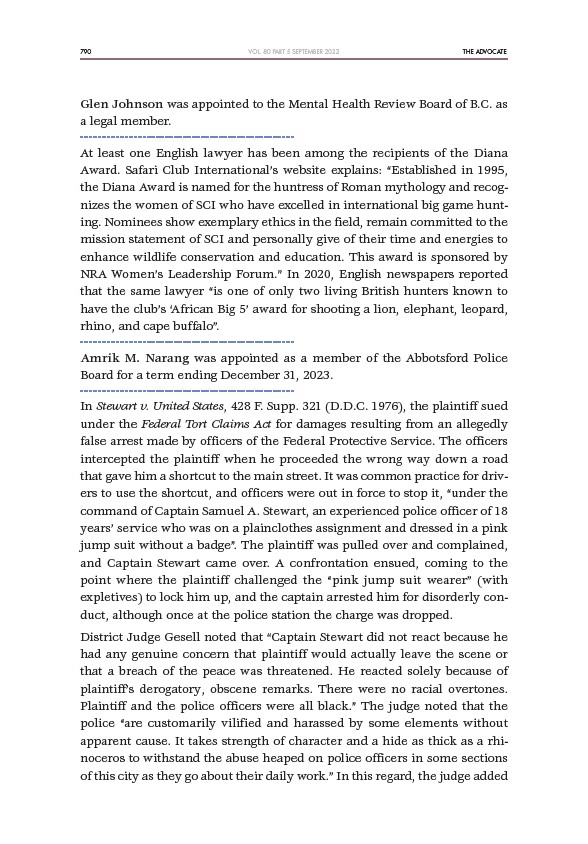
790 THE ADVOCATE
VOL. 80 PART 5 SEPTEMBER 2022
Glen Johnson was appointed to the Mental Health Review Board of B.C. as
a legal member.
At least one English lawyer has been among the recipients of the Diana
Award. Safari Club International’s website explains: “Established in 1995,
the Diana Award is named for the huntress of Roman mythology and recognizes
the women of SCI who have excelled in international big game hunting.
Nominees show exemplary ethics in the field, remain committed to the
mission statement of SCI and personally give of their time and energies to
enhance wildlife conservation and education. This award is sponsored by
NRA Women’s Leadership Forum.” In 2020, English newspapers reported
that the same lawyer “is one of only two living British hunters known to
have the club’s ‘African Big 5’ award for shooting a lion, elephant, leopard,
rhino, and cape buffalo”.
Amrik M. Narang was appointed as a member of the Abbotsford Police
Board for a term ending December 31, 2023.
In Stewart v. United States, 428 F. Supp. 321 (D.D.C. 1976), the plaintiff sued
under the Federal Tort Claims Act for damages resulting from an allegedly
false arrest made by officers of the Federal Protective Service. The officers
intercepted the plaintiff when he proceeded the wrong way down a road
that gave him a shortcut to the main street. It was common practice for drivers
to use the shortcut, and officers were out in force to stop it, “under the
command of Captain Samuel A. Stewart, an experienced police officer of 18
years’ service who was on a plainclothes assignment and dressed in a pink
jump suit without a badge”. The plaintiff was pulled over and complained,
and Captain Stewart came over. A confrontation ensued, coming to the
point where the plaintiff challenged the “pink jump suit wearer” (with
expletives) to lock him up, and the captain arrested him for disorderly conduct,
although once at the police station the charge was dropped.
District Judge Gesell noted that “Captain Stewart did not react because he
had any genuine concern that plaintiff would actually leave the scene or
that a breach of the peace was threatened. He reacted solely because of
plaintiff’s derogatory, obscene remarks. There were no racial overtones.
Plaintiff and the police officers were all black.” The judge noted that the
police “are customarily vilified and harassed by some elements without
apparent cause. It takes strength of character and a hide as thick as a rhinoceros
to withstand the abuse heaped on police officers in some sections
of this city as they go about their daily work.” In this regard, the judge added